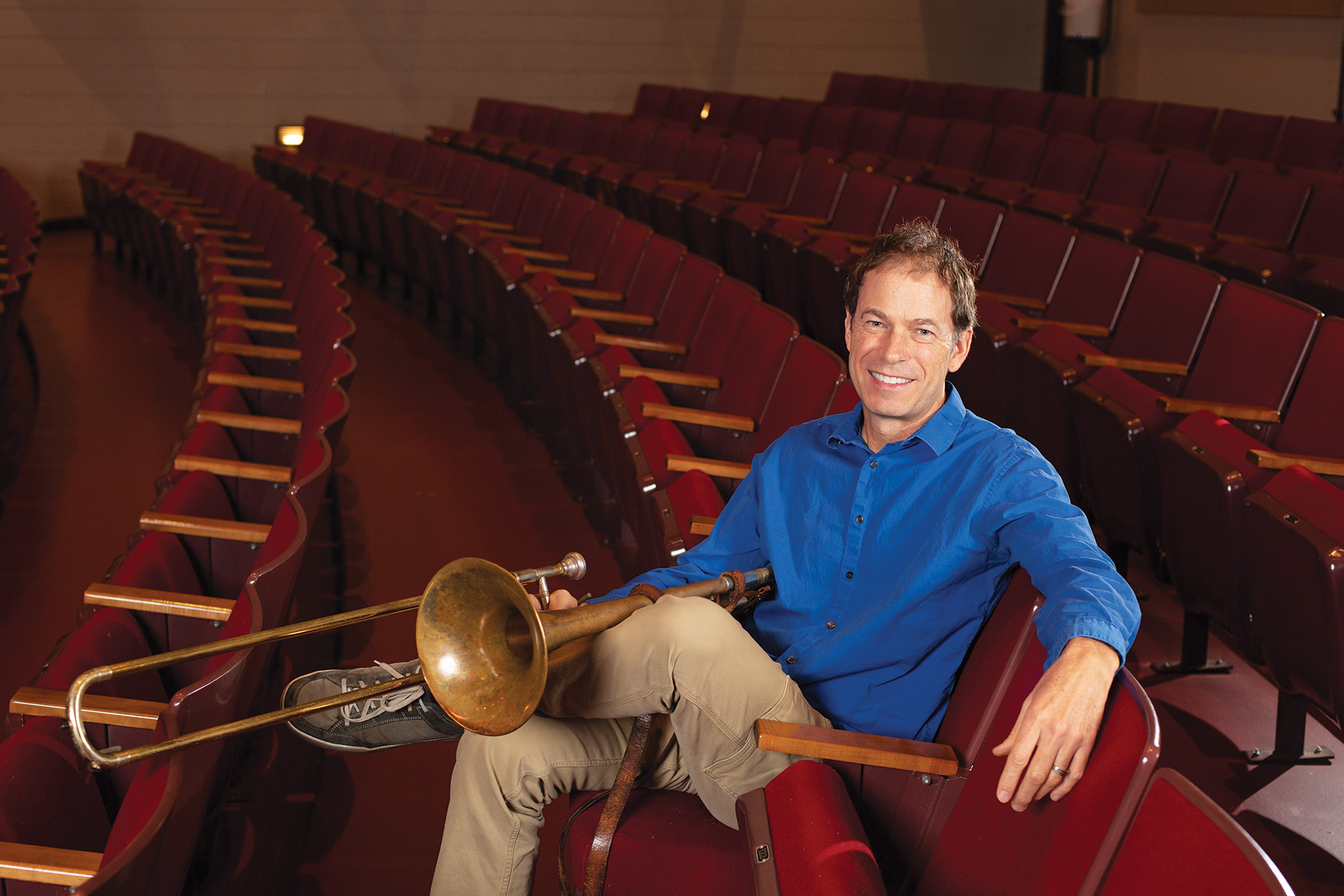Limitless Possibilities
Doug Scarborough leads Whitman’s jazz bands—and an eclectic life outside academia
By Eric Butterman

If ya ain’t got it in ya, ya can’t blow it out.Louis Armstrong
Doug Scarborough has certainly got it. Growing up in the Mississippi Delta, he was drawn to jazz’s rich history of talent and lively improvisation.
“Jazz, at times, is like making music on the spot, improvising a piece with other musicians, and, at its best, it’s the closest thing to flying,” he says.
His passion for the genre and making music would see him play with greats like Benny Golson and Louie Bellson—trying to hold his own while not being too blown away by these gods of jazz he was getting an opportunity to blow with.
Jazz doesn’t stay stuck in its history, Scarborough says. “It’s ever-changing, so you always feel like you have a chance to be on the cutting edge of this art form.”
“I love classical, for example, and there is an element of improvisation there, but in jazz, there’s so much freedom and it’s amazing how that freedom connects so deeply to your soul.”
Making Music at Whitman
For more than a decade, Scarborough’s role at Whitman has fed his soul, providing him a steady stream of talented young musicians to mentor and harmonize with. He directs the Jazz Ensemble 1 and jazz combos. He teaches courses on songwriting, jazz and classical music theory, as well as lessons in trombone and electric bass.
I get a thrill out of playing other instruments … but trombone definitely hits you in its own way. Literally your body is connected to it—through your lungs you are singing through it.DOUG SCARBOROUGH, ASSOCIATE PROFESSOR OF MUSIC
Most recently, highlights of student performances include a music video that served as the college’s 2022 holiday greeting , featuring the jazz ensemble playing an adapted cover of “Liquid Spirit” by Gregory Porter. And on the stage of Cordiner Hall in the fall of 2022, a small, gifted band of Scarborough’s students welcomed the incoming class and their families with a mashup of the classic and the current: John Lennon’s “Imagine” and Maren Morris’s “Circles Around This Town.”
Their professor couldn’t be more thrilled to let these students shine in the spotlight. “Getting to work with great songs and the positive feedback they get, you can see how it motivates them. They spend so much time practicing, and it just feels good to have their work and talent appreciated.”
On the Road & in The Studio
This native of Merigold, Mississippi (population less than 400), where Highway 61 sits prominently—the very highway Bob Dylan mentioned in the title of one of his most famous albums—Scarborough still hits the road with bands when he can. This past summer, he jammed to the tune of nearly 50 gigs, primarily on the keyboard.
Besides being a part of helping people cut a rug, he also has cut another album. His fourth, “The Color of Angels” (Origin Records), pays homage to the richness of Middle Eastern sound, with jazz and even progressive rock finding their way onto the release. The music blends a Palestinian violinist, a Turkish percussionist and American jazz musicians—combining continents for this unique collection and sound. If you ask Scarborough, he believes he’s the first jazz trombonist to play Middle Eastern music on a major label release as a bandleader.
{{1-right}}
“Track number two is a favorite,” he says. “It’s called ‘Limitless’ and the music is truly trying to describe how although at times we may feel boxed in, there are often ways to branch out. It’s getting good radio airplay around the world on jazz radio stations.” The title track, “The Color of Angels,” is also a favorite of Scarborough’s, with imagery around the supernatural. “We live in a world where there seems to be more going on than meets the eye. This tries to capture that wonder.”
Scarborough has even laid down some written word—finding time to co-author a biography on Samuel Jones, a longtime composer-in-residence with the Seattle Symphony. “What an experience it was to work on this book,” he says. “Jones was a rebel for his time. Back in the ’50s and ’60s, classical music was conflicted between whether to be mathematical instead of focusing on harmony, but Jones fought for the latter, believing people possess an innate resonance with harmonious music.”
As for Scarborough, teaching, playing and loving music adds up to a life he’d highly recommend—at a school he loves. “So many students come here with talent, passion and drive,” he says. “I want everyone who walks through these doors to know, if they’ll give it their energy, we’ll give them everything we’ve got.”
